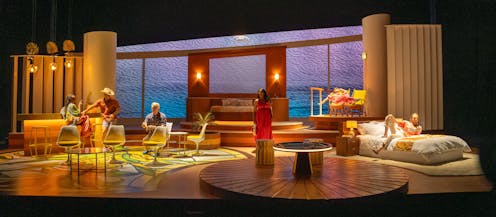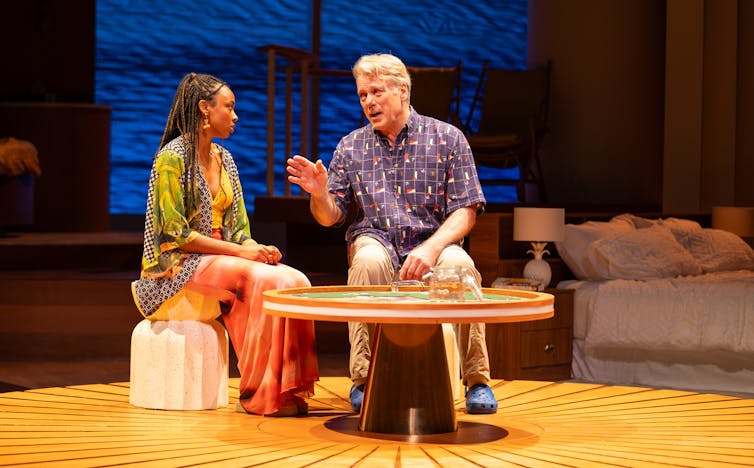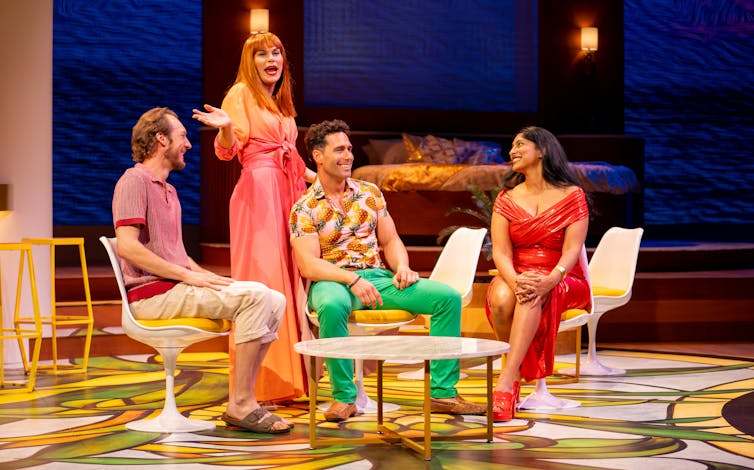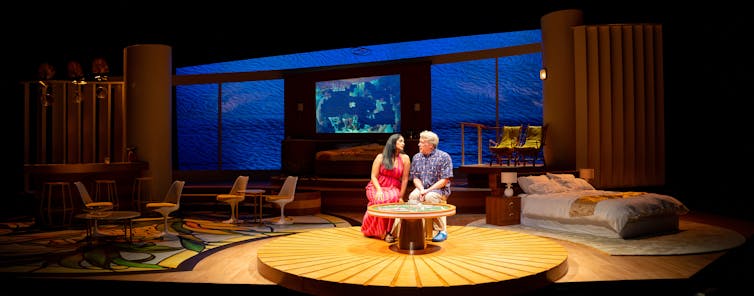
Fun, sex, Renoir and a reckoning might be a succinct way to introduce the new play by David Williamson, The Puzzle. As Williamson noted to me in the foyer, “life would be pretty boring without sex”. However, he writes, in the production program that this comes with a proviso that licentiousness without any moral grounding can lead to human beings inadvertently “upending their lives”.
In other words: be grateful for what you’re got.
Just last month New Wave Australian playwright Jack Hibberd passed away. Hibberd, in writing one of his best-known works, Dimboola (that Williamson directed for the Pram Factory in 1973), spoke of needing to find a human ritual by putting two competing families together in his rural comedy.
Williamson, of the same generation of playwrights, similarly has pointed out “the essence of drama – [is] you put people in a room that should never be in a room together and things happen”.
While Hibberd found this in a country wedding, Williamson has found it, in this instance, in a holiday cruise that appeals as a “lifestyle” change.
Post-COVID has seen an increase in holiday cruises. Though there are comparatively small offerings of adult only cruises euphemistically titled “lifestyle cruises” (or, to be blunter, swingers cruises), they are subject to increasing demand from both young and old.
A lively production
The play’s title is taken from the large Renoir jigsaw puzzle found in the games room of a cruise ship that brings together those wanting to shake up their monotonous lives.
Of course, this becomes a metaphor for how the middle-aged negotiate themes of sexual boredom, polygamy and parenthood. With shades of Williamson’s earlier satirical get-together Don’s Party (1971), the ensemble expertly navigate the promises that “swinging” might do to enliven their character’s sex lives, trapped as they are in close proximity to each other.

This is a lively production with uniformly good performances. Erik Thomson plays Drew, the father trying to improve his relationship with his daughter and provides a solid anchor for the promiscuousness that occurs around him. Ahunim Abebe brings rhythmic physicality to his daughter Cassie as she shocks the father with her own sexual adventures.
The two would-be swinging couples bring verve and vivacity to their performances. Chris Asimos delights as Brian who flips from depression to reinforced post coital vitality. Anna Lindner brings a refreshing groove as she sashays around the cruise ship as Brian’s wife, Michele.

Ansuya Nathan’s Mandy provides a moral counterpoint as her character struggles with the concept of swinging, while her onstage partner Craig, played by Nathan O’Keefe, provides both earnestness and excellent comic timing. At one point during the night O’Keefe toasts his glass too hard and loses his slice of lemon on the floor – which he promptly sucks on to the great amusement of the audience. Clearly an accident, but perhaps worth keeping.
Steady chuckles
Shannon Rush directs with panache, providing some excellent moments of physical vignettes interlaced with the increasing sexual frisson, accompanied by brisk and sharp lighting from Mark Shelton. This in turn is ably supported by the 70s-style guitar soundtrack from composer Andrew Howard and sound designer Patrick Pages-Oliver.
Williamson alludes to the garish décor found aboard cruise ships and Ailsa Paterson’s design doesn’t disappoint. She makes spectacular use of colour and proportion that beckons with promises of a new adventure.
The multi-layered set features tables and chairs with retro 70s/80s feel. The backdrop is a stylised view of the horizon changing with time passing – this is in the form of the Renoir style of brush stroke, neatly linking it to the jigsaw we see being slowly completed.

The play draws steady chuckles and the occasional guffaw as Williamson builds the expectations of the passengers. In the second half, naturalism gives way to farce as the characters experience both comic and life changing reversals. This comes with the moral reckoning of the unintended consequences intercouple sex may bring.
Williamson’s capacity to introduce ideas and return to them in new ways in the dialogue demonstrates his expert craft in constructing witty and challenging dialogue.
This grand old man of Australian theatre shows his continual insight and capacity to satirise the middle-class.
Kudos should also go to outgoing artistic director Mitchell Butel who had the foresight to see the potential in the finished script submitted by Williamson, followed by further development between playwright and company to bring the play to the stage.
The playwright, actors and director gain much from being able to work together over a period of time.
Like the new wave of the 1970s, artists don’t grow in isolation but blossom within a supportive community. In this instance a community Butel has fostered, evident in another fine offering.
The Puzzle is at the State Theatre Company South Australia, Adelaide, until October 12.
Russell Fewster co-ordinates the 2nd year course: State Theatre Masterclass in the Performing Arts Major at the University of South Australia. This is a collaboration between the State Theatre of SA and the University of South Australia.
This article was originally published on The Conversation. Read the original article.







